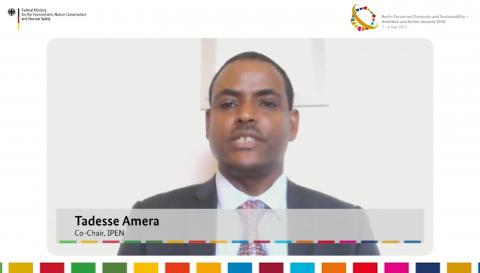What are our priorities for sustainable chemicals management?

Asked "What are the priorities for achieving the SDGs* within the context of the sustainable consumption and production SDG?" at the 8 July 2021 Berlin Forum on Chemical Sustainability: Ambition and Action towards 2030 Stakeholder Dialog, IPEN Co-Chair Dr. Tadesse Amera focused on four topics:
- eliminating the international double-standard,
- creating a better financial structure,
- recognizing the dangers of chemical additives in plastics, and
- the important contributions of youth to a better future.
"We have to avoid the double standard in policy implementation and in financing in chemicals and waste issues" said Amera. "In this area we can mention, for example, highly hazardous pesticides. Around 385 million unintentional pesticide poisonings [are] happening every year worldwide.... In order to deal with this, we need really the action from the global multi-stakeholder groups to come up together and to work on phasing out highly hazardous pesticides... We managed to deal with lead in paint, [which is on] the way [to] being managed."
He continued saying that the petrochemical industry, which pulls in nearly $5 trillion per year, has a responsibility to pay for the health and environmental harms that chemicals cause. A small global fee on chemicals, which CIEL and IPEN proposed in 2020, would go a long way to helping fund the sound management of chemicals.
As key stakeholders for a toxics-free future, young people can play a part by learning the chemistry, developing the field of green design, and recognizing that we are facing a global crisis.
